Yes or No?
Comedy writer Armando Iannucci and journalist Helen Lewis decode the utterly baffling world of political language.
This week, Helen and Armando take a step back and look at whether we're seeing the death of nuance in political debate. Is everything boiled down to 'yes or no' questions? What are the shibboleths of modern politics, and does the language you use, or decline to use, put you firmly on one side of a debate?
Listen to Strong Message Here every Thursday at 9.45am on Radio 4 and then head straight to BBC Sounds for an extended episode.
Have you stumbled upon any perplexing political phrases you need Helen and Armando to decode? Email them to us at strongmessagehere@bbc.co.uk
Sound Editing by Kate Mac
Production Coordinator - Katie Baum
Executive Producer - Pete Strauss
Produced by Gwyn Rhys Davies. A BBC Studios Audio production for Radio 4.
An EcoAudio Certified Production.
Press play and read along
Transcript
Transcript is processing—check back soon.

